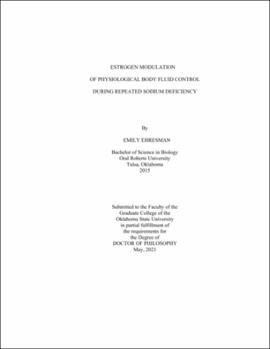| dc.description.abstract | Throughout much of life, women have lower blood pressures than men. However, after menopause, women's blood pressures surpass that of men, suggesting that estrogen plays a role in preventing hypertension. The low salt diet is a first line treatment for hypertension, but it is a difficult diet to maintain. Patients may alternate between periods of high and low salt intake, essentially "yo-yo" dieting. The effects of this are unknown, particularly in females. Additionally, it is unclear if any effects may be altered by the presence or absence of estrogen. Our goals were to determine the alterations in salt intake and body fluid hormones that occur with repeated dietary sodium deprivations. Using ovariectomized rats with (EB) and without (OIL) estrogen treatment, we subjected rats to one or two dietary sodium deprivations using low salt laboratory chow. 0.5 M NaCl and water intakes were recorded after each period of regular chow or deprivation. After deprivation, rats were sacrificed, and trunk blood was collected for analysis of vasopressin, norepinephrine, epinephrine, and aldosterone content. Plasma sodium concentration, plasma protein concentration, body weight, and uterine weight were also measured. There was no difference in the salt intakes of OIL- or EB-treated rats after one or two dietary sodium deprivations. However, EB-treated rats drank a less concentrated solution overall, suggesting less overcompensation after dietary sodium deprivation. Additionally, after a single episode of dietary sodium deprivation, EB-treated rats' consumption remained elevated above baseline even after returning to regular laboratory chow. These behavioral differences were not explained by alterations in vasopressin, norepinephrine, epinephrine, or aldosterone. Plasma sodium and plasma protein concentrations also did not show alterations related to the change in behavior. Further research is necessary to determine the mechanism behind these changes in intake in EB-treated rats, which may ultimately be clinically relevant for both pre- and postmenopausal women on the low salt diet. | |
